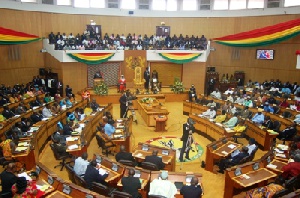Parliament on Tuesday urged a bipartisan approach to addressing Ghana’s perennial and worrying housing deficit in order to tackle the socio-economic malaise rising out of the problem.
They held that the inadequacy of the country’s housing stock had led to a demand pull that landlords have capitalized on to make abnormal profits, a situation that was grossly affecting quality of life and breeding malcontent and insecurity in the society.
The legislators, who were contributing to a statement made on the floor of Parliament by the MP for Wa East, Ameen Salifu on the impact of high rent charges on the populace, maintained that government needed to adopt pragmatic measures to solve the supply situation to ease the indignity that people lived in as a result of the shortfalls in housing delivery.
They urged government to commit itself to completing all unfinished housing projects across the country, give tax holidays to estate developers, review of the Rent Control Law immediately and address the supply situation of building materials and promote the usage of indigenous construction materials as initial measures to addressing the issue.
Mr Salifu said it was important that the current deficit of 1.6 million houses was drastically reduced before life became unbearable for Ghanaians.
He said the National Housing Policy that has been at the draft stage for the past seven years should be adopted to give the country a sense of direction in the matter.
The MP said what was of utmost importance was to give high priority to local building materials, which could reduce the cost of building and the improvement of the supply chain of various building materials.
He called for a strengthening of the Rent Control Department with the appropriate legal backing to protect tenants from excessive rent charges.
Mr Salifu also called for the consideration of the recent 35 percent hike in the prices of cement to enable the facilitation of cheaper and readily available housing units, urging the exemption of value added tax on building components sourced locally.
He implored stakeholders to join forces to tackle the housing deficits and make efforts to complete all housing projects that had been abandoned.
Ghana’s housing deficit stands at a worrying 1.6 million, and only able to produce around 40,000 units per annum, against an annual requirement of about 100,000 units.
The problem is compounded by rapid population growth and increasing urbanization.
David Tetteh Assumeng, Member of Parliament (MP) for Shai-Osudoku also harped on the need to give tax immunity to estate developers and the utilization of local materials to solve the rising accommodation problem.
Frank Annor Dompreh, MP for Nsawam-Adoagyiri, also urged government to show commitment to resolving the issue, suggesting that all housing projects initiated by previous governments should be completed and that other forms of technology should be explored to reduce the cost of building to the barest minimum.
Madam Laadu Ayii Ayamba, the MP for Pusiga urged the rent control department to work with all stakeholders to ensure that the rent people pay for accommodation was acceptable.
Kwaku Agyeman-Manu, MP for Dormaa Central proposed that government adopted a tax regime to control rent hikes, explaining that when a landlord charges above a certain threshold for a particular house type, the fellow is made to pay tax on the rent, saying that this would curb the practice.
The Minority Leader, Osei Kyei Mensah-Bonsu, also suggested that government facilitates the acquisition of land and also critically assess the high taxes on building material.
Regional News of Wednesday, 17 July 2013
Source: GNA













